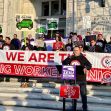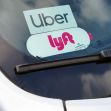The California Supreme Court will hear oral arguments on Tuesday (May 21) in a critical case challenging the constitutionality of Proposition 22, a ballot measure that allows app-based services like Uber and Lyft to classify their drivers as independent contractors rather than employees.
The Service Employees International Union (SEIU) and four drivers are contesting Prop 22, asserting that it violates the state constitution. According to multiple studies, this issue is pivotal for the gig economy, as employee classification would require companies to provide benefits such as minimum wage, overtime pay, and expense reimbursements, potentially increasing costs by up to 30%.
Background on Proposition 22
Prop 22, passed by nearly 60% of California voters in November 2020, exempts app-based drivers from a 2019 state law known as AB5. AB5 narrows the criteria under which workers can be classified as independent contractors. Instead, Prop 22 permits these companies to classify drivers as independent contractors provided they are paid at least 120% of the minimum wage while transporting passengers and receive expense reimbursements and health insurance subsidies.
Uber, Lyft, and other companies spent over $200 million to support Prop 22, arguing that without it, the increased costs could drive them out of the California market, the largest in the U.S.
Legal and Industry Reactions
Joseph Bryant, SEIU executive vice president, emphasized the significance of the case in the broader effort to secure legal protections for gig workers nationwide. “No matter the outcome, we will not be intimidated by corporations' unconstitutional attempts to dictate law in California,” Bryant stated.
The California Attorney General's office, defending Prop 22, declined to comment directly, referring instead to its court filings. Meanwhile, Protect App-Based Drivers and Services, an industry-backed group, has intervened in the case. Stephanie Whitfield, an Instacart driver representing the group, praised the flexibility of her job. “It’s not just about me - it’s ensuring the people and families I deliver to are able to continue to have access to the services they rely on,” Whitfield said.
Argument Against Prop 22
The primary argument against Prop 22 is that it violates the California Constitution by limiting the legislature’s authority to enact laws regarding workers' compensation for app-based drivers. Opponents argue that the initiative interferes with the state’s legislative power to ensure comprehensive protection and benefits for workers. Specifically, the contention is that Prop 22 unlawfully restricts the legislature's ability to include app-based drivers within the scope of California's workers' compensation laws, thereby infringing on the separation of powers mandated by the state constitution.
In 2021, a state judge ruled that Prop 22 was unconstitutional on these grounds, asserting that it improperly hampered the legislature's ability to amend the workers' compensation system to potentially include gig workers. This decision was later challenged, leading to the current review by the California Supreme Court.
Nationwide Implications
California is one of several battlegrounds in the national debate over gig worker classification. Recently, Minnesota lawmakers passed legislation setting a minimum wage for gig drivers, while Massachusetts' top court is considering competing ballot proposals regarding gig worker classification. The U.S. Department of Labor is also facing legal challenges over a rule that would make it harder for companies to classify workers as independent contractors.
Economic Impact on Gig Drivers
A study by the University of California, Berkeley, released on Monday, revealed that most gig drivers in major U.S. cities, including Los Angeles and San Francisco, earn significantly less than the minimum wage when accounting for full costs, including downtime. According to the study, drivers in California were paid less than their counterparts in Boston, Chicago, and Seattle.






